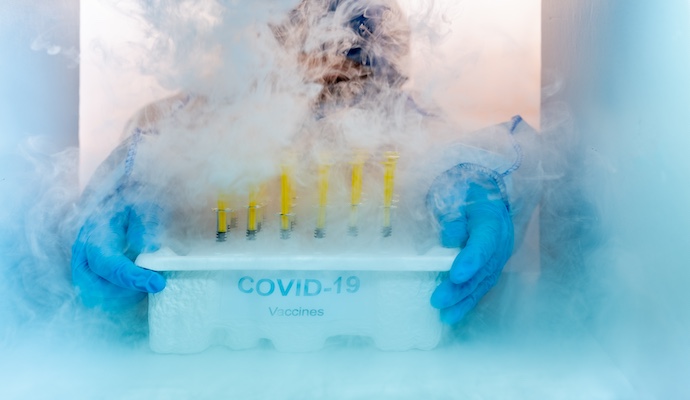Revolutionizing Vaccine Storage and Distribution with Innovative Solutions
Vaccine storage and distribution innovations are crucial for ensuring vaccine efficacy, expanding accessibility, and enhancing real-time monitoring.

Source: Adobe Stock
- The global COVID-19 pandemic has highlighted the critical role of vaccines in controlling the spread of infectious diseases. As the demand for vaccines continues to rise, developing innovative solutions for their storage and distribution has become increasingly important. Traditional vaccine storage and distribution methods have faced numerous challenges, including temperature control, logistics, and regulatory compliance. However, emerging technologies are revolutionizing the pharmaceutical industry, offering new possibilities to overcome these challenges.
Challenges in Vaccine Storage and Distribution
Vaccines are delicate biological products requiring specific temperature conditions to maintain efficacy. The most common challenge in vaccine storage and distribution is the need for continuous refrigeration. Many vaccines must be stored at temperatures between 2 and 8°C to ensure their potency. Deviations from this temperature range can result in reduced effectiveness or even complete loss of efficacy. Maintaining the cold chain during storage and transportation is crucial to prevent temperature excursions that could compromise the quality of vaccines.
Logistics also present challenges in vaccine distribution. Vaccines need to reach diverse locations, including remote areas with limited infrastructure. Ensuring the integrity of the vaccine supply chain from the manufacturer to the end user requires efficient logistics management, real-time monitoring, and secure transportation.
Globally, the WHO approximates that almost half of all vaccines are discarded annually.
Emerging Technologies
Emerging technologies are transforming vaccine storage and distribution, offering innovative solutions to address the challenges faced by the pharmaceutical industry. Notable advancements include cold chain monitoring systems, portable refrigeration devices, and vaccine delivery.
Cold Chain Monitoring Systems
Cold chain monitoring systems utilize IoT (Internet of Things) technology to track vaccines' temperature and other environmental conditions in real time. These systems use sensors and wireless connectivity to continuously monitor and alert healthcare providers or logistics personnel in case of temperature excursions. This technology enables proactive interventions to prevent vaccine spoilage and ensures the integrity of the cold chain.
Portable Refrigeration Units
Portable refrigeration units are compact, self-contained devices that provide temperature-controlled storage for vaccines in transit. These units have battery-powered cooling systems and can maintain the required temperature range for extended periods, even without electricity. Portable refrigeration units are particularly useful in reaching remote and resource-constrained areas with limited access to reliable electricity. For example, in places where cold-chain infrastructure issues existed before the pandemic, scientists are creating innovative solutions like solar-powered refrigeration systems to extend the shelf life of vaccines.
Drones for Vaccine Delivery
The COVID-19 pandemic has expedited the integration of drones for the global delivery of medicines and vaccines. This advancement has proven highly advantageous in areas facing geographical barriers and limited access to refrigerated transportation, where challenges are particularly pronounced. Drones can bypass traffic congestion and deliver vaccines quickly to their destination. They can also overcome geographical barriers, making them an efficient option for reaching isolated communities. However, implementing drone delivery systems requires addressing regulatory and safety considerations.
Advantages
Embracing innovative technologies for vaccine storage and distribution presents numerous benefits, including heightened vaccine effectiveness, increased vaccine accessibility, and the implementation of real-time monitoring and alert systems.
Improved Vaccine Efficacy
By ensuring the maintenance of the cold chain and preventing temperature excursions, innovative storage and distribution solutions help preserve the efficacy of vaccines. This translates into better protection against infectious diseases and improved public health outcomes.
Enhanced Access to Vaccines
Emerging technologies enable the delivery of vaccines to remote and underserved areas, expanding access to immunization. Portable refrigeration units and drones can overcome geographical barriers, ensuring vaccines reach even the most isolated communities.
Real-time Monitoring and Alert Systems
Cold chain monitoring systems provide real-time visibility into vaccines' temperature and environmental conditions throughout the supply chain. This allows for proactive interventions in case of deviations, reducing the risk of vaccine wastage and ensuring quality control.
"Active packaging systems incorporate sensors or devices that can record information, such as temperature, and transmit it to a database or cloud for analysis by the sender and receiver,” Alex Guillen, a Global Subject Matter Expert for Life Science and Pharmaceuticals at Tive, explained to PharmaNewsIntelligence.
Regulatory and Compliance Consideration
Implementing vaccine storage and distribution innovations requires careful attention to regulatory and compliance considerations. These considerations include regulatory approval, data privacy and security, and international standards.
Regulatory Approval
Any new technology or solution introduced in the healthcare industry must comply with regulatory requirements and obtain necessary approvals. Manufacturers and distributors of innovative storage and distribution solutions must ensure their products meet regulatory authorities' necessary quality, safety, and efficacy standards.
Data Privacy and Security
Cold chain monitoring systems and other technologies involve collecting and transmitting sensitive data. Protecting patient privacy and ensuring the security of data is crucial. Compliance with data protection regulations and implementing robust cybersecurity measures are essential to maintain the integrity and confidentiality of information.
International Standards
International vaccine storage and distribution standards, such as those developed by the WHO, are vital in ensuring quality and consistency. Manufacturers and distributors should align their processes and technologies with these standards to promote interoperability and global best practices.
Vaccine storage and distribution innovations are revolutionizing the pharmaceutical industry, addressing the challenges of maintaining the cold chain, reaching remote areas, and ensuring regulatory compliance. Emerging technological advancements offer improved vaccine efficacy, enhanced access to immunization, and real-time monitoring capabilities. However, they must be implemented in compliance with regulatory requirements and data privacy standards. By leveraging these innovations, the healthcare industry can overcome vaccine storage and distribution challenges, ultimately leading to better public health outcomes and effective control of infectious diseases.
